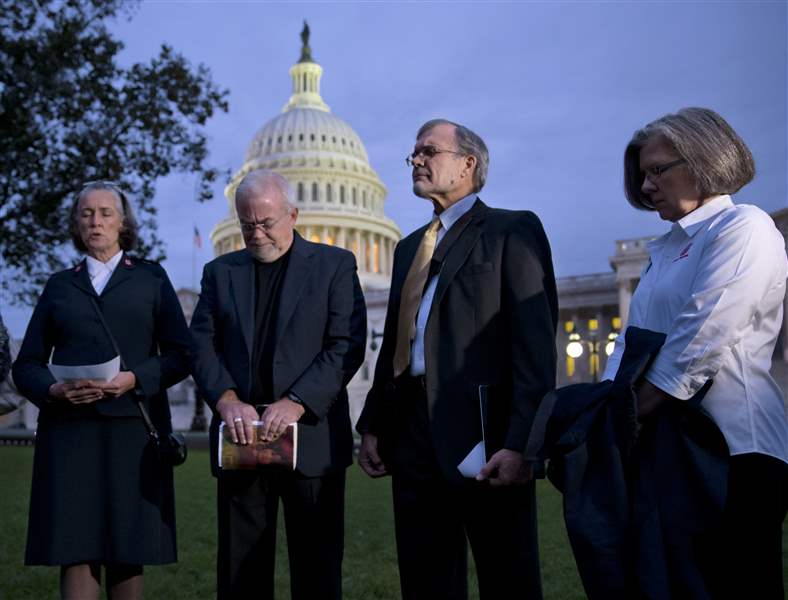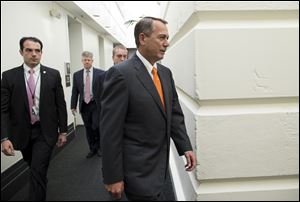
Boehner says House won't block Senate deal to raise debt ceiling, reopen government
10/16/2013
With time growing desperately short for Congress to prevent a threatened Treasury default and stop a partial government shutdown, a group of ministers, the Circle of Protection, pray at dawn at the Capitol to draw attention to lawmakers that political divisiveness hurts the most vulnerable Americans, in Washington, Tuesday, Oct. 15, 2013. From right are Kathy Saile, Gary Cook, Rev. Jim Wallis, and Major Carole Busroe of the Salvation Army. (AP Photo/J. Scott Applewhite)
ASSOCIATED PRESS

Speaker of the House Rep. John Boehner, a Republican from Ohio, walks to a meeting with House Republicans to discuss the Senate measure on the government shutdown and debt ceiling.
WASHINGTON — House Speaker Boehner says U.S. House of Representatives won’t block vote on bipartisan Senate deal on budget.
After the Senate announced the deal on Wednesday to reopen the government and resolve, for now, the U.s. debt crisis, President Barack Obama quickly endorsed it and urged Congress to approve it swiftly.
Obama spokesman Jay Carney, briefing reporters on Obama's reaction to the bipartisan Senate deal that emerged on Capitol Hill, said the agreement will reopen the government and remove the threat of a debt default.
He said the United States is close to the point where the Treasury Department cannot borrow money to meet its debt obligations, which is why Congress needs to move fast.
While a wave of relief swept the White House at the prospect of an end to a 16-day government shutdown and the avoidance of a debt default, there was still a degree of uncertainty as to what would happen to the Senate legislation in the Republican-controlled House of Representatives, where a faction of conservatives has been in no mood to compromise.
“We are not putting odds on anything,” Carney said when asked about prospects for House passage.
Earlier, the Senate announced a last-minute deal on Wednesday to avert a historic lapse in the government's borrowing ability and a potentially damaging debt default, and to reopen the government after a two-week shutdown.
But even if the Senate and House of Representatives manage to overcome procedural hurdles to seal the deal before Thursday - when the Treasury says it will exhaust its borrowing authority - it will only be a temporary solution that sets up the prospect of another showdown early next year.
Major U.S. stock indexes rose more than 1 percent on optimism that lawmakers were finally reaching a deal to end the weeks-long fiscal impasse.
Senate Majority Leader Harry Reid and Republican leader Mitch McConnell announced the agreement on the Senate floor, where it was expected to win swift approval after a main Republican critic of the deal, Senator Ted Cruz of Texas, said he would not use procedural moves to delay a vote.
Weeks of bitter fighting among Democrats and Republicans over Obama's signature healthcare reform law led to a partial government shutdown on Oct. 1, sidelining hundreds of thousands of federal workers. Cruz and other Republicans backed by the conservative, small government Tea Party movement want to repeal or delay the healthcare law.
The initial fight over the healthcare law turned into a bigger argument over the debt ceiling, threatening a default that would have reverberations around the world.
“If we don't get a default, it would be like Y2K. People were staying up all night worried about what would happen during that deadline. Then nothing happened,” said David Keeble, global head of interest rate strategy with Credit Agricole Corporate & Investment Bank in New York, referring to worries about the millennium computer bug in 2000.
Both Democrats and Republicans are confident that the U.S. House of Representatives will have enough votes on Wednesday to pass the bipartisan Senate plan, a top Democratic aide said.
Aides to Speaker Boehner, the top Republican in Congress, called senior Senate staff to say the House would vote first on the measure, the aide said. The aide said it appears certain to be approved with mostly Democratic votes.
Lawmakers are racing against time. While analysts and U.S. officials say the government will still have roughly $30 billion in cash to pay many obligations for at least a few days after Oct. 17, the financial sector may begin to seize up if the deal is not finalized in both chambers.
“Today is definitely not the day to be conducting any serious business as traders across the globe will be hypnotized by their TVs/terminals and anxiously waiting for something to hit the news wires,” Jonathan Sudaria, a trader at Capital Spreads in London, wrote in a client note.
Fitch Ratings has said it could cut the U.S. sovereign credit rating from AAA, citing the political brinkmanship over raising the debt ceiling.
The deal that emerged on Wednesday would basically give Obama what he has demanded for months: A straight-forward debt limit hike and government funding bill.
The deal would extend U.S. borrowing authority until Feb. 7, although the Treasury Department would have tools to temporarily extend its borrowing capacity beyond that date if Congress failed to act early next year. It would also fund government agencies until Jan. 15.
The budget deadlock led to federal agency shutdowns at the beginning of the fiscal year on Oct. 1 as Obama and his fellow Democrats stood firm against changing the healthcare law.
Uncertainty over the shutdown and the debt ceiling have already taken a toll on the economy and on confidence in U.S. assets.
Richard Fisher, the hawkish president of the Federal Reserve Bank of Dallas, told Reuters on Tuesday that “reckless” U.S. fiscal policy will likely force the Federal Reserve to stand pat on monetary policy this month rather than reducing bond purchases the central bank has used to help support the economy.